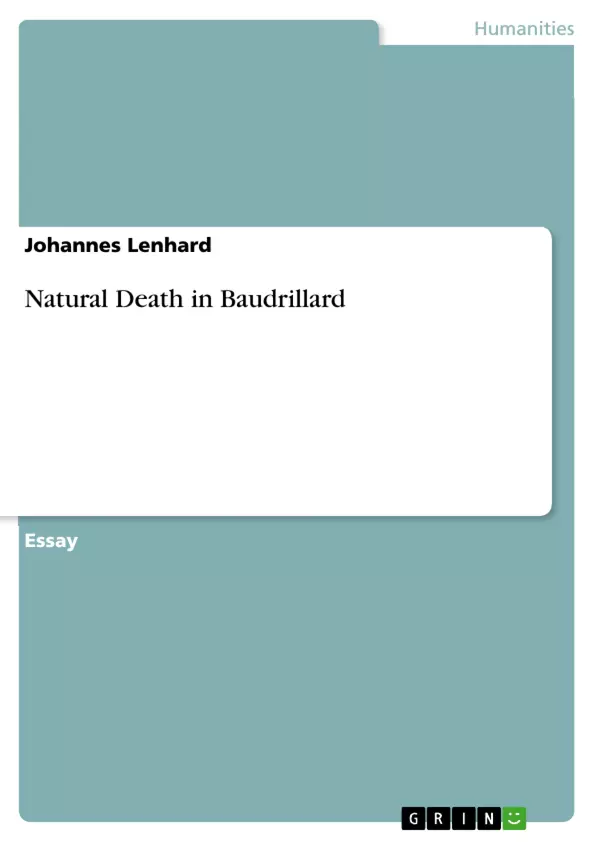According to Baudrillard, the contemporary ‘value system’ is based on binary oppositions. The most vital of those are good and evil, man and machine and crucially important life and death. In our society, death is increasingly separated from life in stark contrast to what is still to be found in the ‘primitive cultures’. Without being able to explain the alternative system – symbolic exchange – in its complexity, it is important to note its contrasting idea of “a circular form, a circuit, reversibility” (Baudrillard, 2003: 16ff). In a symbolic system associated but not limited to ‘primitives’, death is not negativity, not endpoint but rather charged with symbolic meaning as part of a constant exchange procedure, always part of life. For us, death is ‘abnormal’ and we are constantly striving to extinguish it, make it ‘extraterritorial’ (Baudrillard, 1993: 126, 182) (e.g. in hospitals, out-of-town cemeteries, palliative clinics). In the following paragraphs, the essay will suggest a reading of Baudrillard’s contrasting notion of ‘natural death’ that he claims to be ‘everyone’s right and duty’. In the first part, we give a close reading of Baudrillard’s notion of natural death - without a primarily critical reflection. What will be suggested is that progress creates both the possibility for a natural, i.e. designed, death and its imperative. The critical reflection of part two will try to qualify Baudrillard’s statements with a general critique of his ironic style and advance arguments with regards to content: How is it possible to close of individuality? Is it really a right for ‘everyone’? Before this critical account can be appreciated, however, the notion of ‘natural death’ shall be explained in the following.
Inhaltsverzeichnis (Table of Contents)
- Introduction
- A Close Reading of Baudrillard's "Natural Death"
- Death as an Economic Phenomenon
- Naturalized Death in the Era of Technological Progress
- Natural Death as a Simulacrum
- The Duty to Natural Death: Perpetuation and Reproduction
- A Critical Reflection on Baudrillard's Statement
- The Question of Individuality and Immortality
- The Limits of Choice in the Face of Class Medicine
- The Disturbing Ambiguity of Baudrillard's Style
Zielsetzung und Themenschwerpunkte (Objectives and Key Themes)
This essay examines Jean Baudrillard's statement that "everyone has a right, but also a duty to a natural death," as it relates to the contemporary "value system" and the role of technological progress in shaping our understanding of death.
- The binary opposition between life and death in modern society
- The transition from symbolic death in "primitive cultures" to the naturalized death of the capitalist political economy
- The role of technological progress in shaping the concept of natural death and its implications for control and responsibility
- The interplay between individual and collective power in defining the meaning of death
- The critical analysis of Baudrillard's style and its potential for ambiguity
Zusammenfassung der Kapitel (Chapter Summaries)
The essay begins with an analysis of Baudrillard's notion of "natural death" within the context of the capitalist political economy. It argues that the principle of accumulation in capitalism has transformed death into an irreversible economic phenomenon, separating it from life and turning it into a form of "due payment" for a lifetime of survival. In this system, natural death is not a natural process, but a "systematic degeneration" designed by technological progress. The essay then explores the consequences of this "naturalized death" for our understanding of control, responsibility, and the relationship between individuals and society.
The essay then examines Baudrillard's assertion that natural death is both a right and a duty for everyone. It suggests that the right to natural death arises from the control that technological progress has given us over our own mortality. However, it also argues that this right is coupled with a duty to conform to the system's design, which dictates the terms of life and death. This duty, the essay argues, is ultimately rooted in the logic of profit and privilege, which perpetuates the system through a constant cycle of reproduction and extinction.
Schlüsselwörter (Keywords)
Key concepts explored in this essay include natural death, symbolic exchange, capitalist political economy, technological progress, control, responsibility, individual versus collective power, and Baudrillard's style of irony and paradox. The essay critically examines the implications of these concepts for our understanding of contemporary society and the meaning of death in a technologically advanced world.
Frequently Asked Questions
What is Baudrillard's concept of 'natural death'?
Baudrillard argues that in modern society, death has become a designed, 'naturalized' phenomenon controlled by technological progress, rather than a symbolic part of life.
How does modern society differ from 'primitive cultures' regarding death?
In primitive cultures, death is part of a symbolic exchange and constant circuit, whereas in modern society, it is separated, marginalized, and treated as an abnormality.
Why does Baudrillard call death an 'economic phenomenon'?
In a capitalist political economy, death is seen as a 'due payment' for a lifetime of survival, becoming an irreversible endpoint linked to the logic of accumulation.
What does Baudrillard mean by the 'duty' to a natural death?
He suggests that because we have technological control over mortality, we are now obligated to conform to the system's design for how and when we should die.
How is 'natural death' related to the concept of a simulacrum?
Natural death is a simulacrum because it is a model-driven, artificial version of a biological process, managed by institutions like hospitals and clinics.
- Arbeit zitieren
- Johannes Lenhard (Autor:in), 2012, Natural Death in Baudrillard, München, GRIN Verlag, https://www.grin.com/document/193220



